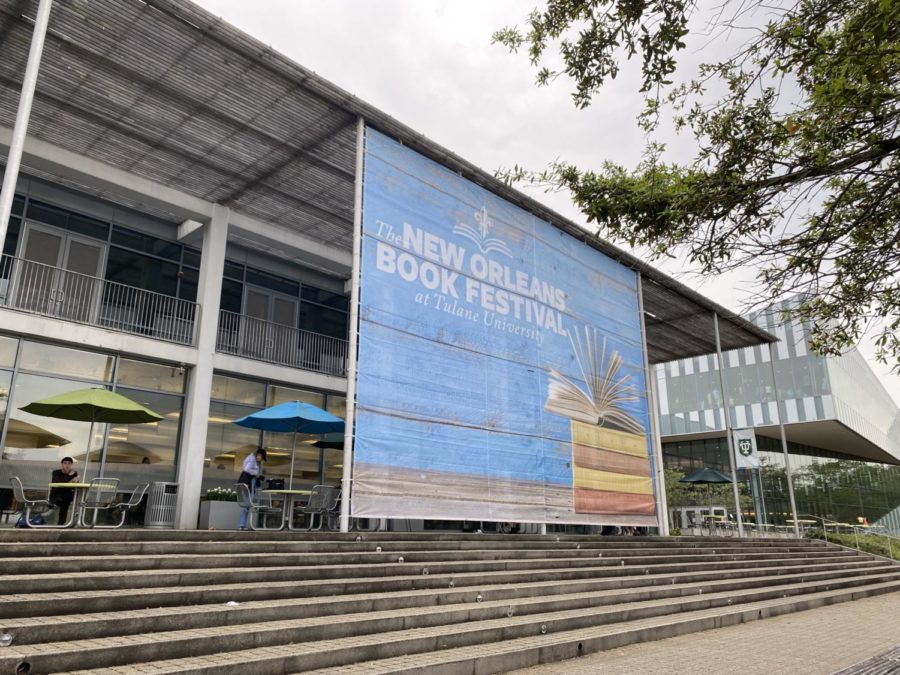Book Festival draws Jill Biden, big crowds on Friday
March 12, 2023

Two billionaires and an attorney general are hard to beat.
But on Friday, the New Orleans Book Festival tried to do it. Authors – all 74 of them – descended on campus and talked writing and politics, told stories of journalism and physics and debated the future of democracy.
First Lady Jill Biden made a quiet afternoon appearance in the Diboll Gallery above the Commons, where she listened to authors Geraldine Brooks, Sadequa Johnson and Katy Simpson Smith. Biden, whose daughter graduated from Tulane in 2003, was visiting the city this weekend to tour the Louisiana Cancer Research Center.
“How exciting to come and listen to authors and what they’re writing about,” Biden said to the panel audience. “For me, it’s a dream come true.”
Her quick stop went unnoticed by many visitors, who spent the day learning about books, buying new ones and scoring signatures from writers.
Two friends, Pam Washington and Dee Dupie, sat together on Friday morning and listened to Geraldine Brooks’ every word.
“What would I rather be doing today?” Washington said afterwards. “Nothing.”
“Last year when we came, I said, ‘That’s the best festival I’ve ever been to in my life,” Dupie said.
Friday’s events followed the festival’s kickoff with investor David Rubenstein, Microsoft founder Bill Gates and former-Attorney General Eric Holder.
Brooks started the morning telling fans about her book, “Horse,” a story of injustice and equestrians in the American South. Michael Lewis, another bestselling author who interviewed Brooks, extolled her career as a war correspondent turned novelist.
“It was like watching a dog walk on its hind legs,” Lewis said of Brooks’ move from journalism to novel-writing. “I just thought, ‘She can do that too?’”
Co-author of “This Will Not Pass” and POLITICO columnist Jonathan Martin told guests democracy is in danger and politics are not always what they seem.
A story: once, Martin and his co-author Alex Burns were sitting with Former President Donald Trump at his Mar-a-Lago home, Martin told an audience of nearly 100. Lindsey Graham called. Trump put him on speakerphone. He asked Graham to boast about Trump’s endorsement and golf game. Praise ensued.
Martin and Burns left Trump, then called Graham again.
“Is he gone?” Graham asked when he picked up the phone.
A few hours later, a panel with Tulane professor Walter Isaacson and physicist Brian Greene filled up so fast that fans trickling in late watched the two authors from video screens in a nearby room.
Isaacson asked Greene why he studies theoretical physics.
“I want to understand what it tells us about our place in some kind of cosmic order,” Greene said.
Follow up: do we have free will?
“The sensation that we are in the driver’s seat,” Greene said, “is completely illusory.”
Michelle Miller, co-host on CBS Saturday Morning, recalled her journey as a Black woman in journalism. As an intern at the Star Tribune in Minneapolis, a young Miller was told by a newspaper executive, “you need to check your Blackness at the door.”
“I don’t think journalists are objective,” Miller said. “I think that’s an aspiration.”
A fellow CNBC reporter Sharon Epperson interviewed Miller about her upcoming memoir “Belonging” and the complicated tapestry of her family.
“I remain my mother’s secret,” Miller said, giving the audience a hint of the origin story in her book.
Journalists Carl Bernstein, Jason Berry and Betsy Fischer Martin told a standing-room only crowd that truth is under threat and local news has never been more important.
Journalism, Bernstein said, is finding the “best obtainable version of the truth.”
“What can we average citizens do to support the ideals of a free press other than subscribing to a newspaper?” an audience member asked.
“Radical idea,” Bernstein said. “Why can’t we buy two subscriptions?”
In the afternoon, every seat was filled as Tulane economics professor Gary Hoover and author Heather McGhee discussed reparations, college loans and the intersection of racism and the economy. McGhee said the economy is not a zero-sum game because small business innovation can expand our future.
Earlier that morning, crowds quietly leaned in to listen to biographer Jon Meacham’s unique retelling of Abraham Lincoln’s life.
“We all have the capacity, if we want, to build and not tear down; to leave things stronger than weaker. And we are in danger, you and I, of leaving democracy weaker than we found it,” Meacham said while reflecting on the ups and downs of Lincoln’s presidency.
“We can’t stop trying.”
Great to see @FLOTUS celebrate the joy of reading at @NOLABookFest, Mardi Gras for the mind at @Tulane!! pic.twitter.com/A96MhkdtwI
— NOLA Book Festival (@NOLAbookfest) March 10, 2023






















Leave a Comment